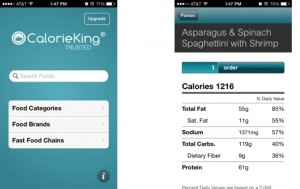Body Composition turned into Science
Like many others posting on the blog, I do track certain aspects of my diet via quantifying apps. Just like work or relationships or education, health and your own perception of health is such a massive piece of our lives. It affects our longevity, confidence, mood and self-identification. We spend hours and hours a week on school, work and socializing to improve our lives, why would we not approach our health and fitness with the same level of detail and priority? In comes quantified self. Calorie counter, amwell, endomondo, diet assistance, fooducate, ideal weight, myfitnesspal are just a few names out of dozens of other diet and health tracking apps available to us today. I personally have ditched almost all my self-tracking apps due to data storage limitations, however I still manually perform all the functions of many of these apps, and for the sake of this exercise I will talk about my use with one of my favorites before I deleted it.
CalorieKing was and still is my tracking app of choice. It’s not as extensive as myfitnesspal in terms of features, but its food weight feature puts it ahead of myfitnesspal in terms of accuracy, which I like. I am very fitness oriented. I compete in powerlifting competitions and amateur bodybuilding, and the emphasis my sport puts on diet is unparalleled. I am usually required to gain 20-30 pounds in the off-season, and then drop 15-25 as competition approaches to stay competitive. It is inevitable to stagnate if macronutrients are not calculated. The thing I like about CalorieKing, and why I downloaded it to begin with, is I am able to weigh an apple on a food scale and put in the exact weight in ounces or whatever unit and it will give me almost the exact calories I am consuming. Many apps such as the weight watchers app use a point system or a “big, small, medium” scale that give too much discrepancy in the calorie calculation. Even myfitnesspal is not as accurate as I would like. The combination of this accuracy with the ability to add and subtract my food over the course of the day to hit a calorie and protein target was the reason I initially downloaded the app. CalorieKing also tells me all the other nutrients (proteins, fats, carbohydrates) down to a T. This makes manually, or digitally tracking food incredibly accurate and thus minimizing error and frustration in my diet. If I am not losing or gaining weight properly as well, I can look back at the data and analyze what went wrong and what I need to change to achieve my goals with accuracy and efficiency.
To use the app all you need to do is know what you are eating. From then you can choose to input the actual weight or an estimate based on potion size. You input the information as frequent or as infrequent as you want, but the more honest you are with the app the better the more you get out of it.
For the purpose it serves it does a pretty good job. The only issue I have with it is multi-ingredient dishes like chili for example. It uses an average or a ‘typical’ dish’s macronutrients to produce the calculation, which is pretty darn good, but small ingredient discrepancies between your meal and their calculation can throw it off. What I mean by that is the chili they have listed may have 4oz of beans in the mix vs. your grandma’s homestyle kind that have 2oz. There is no way to adjust those values. Ideally they would make a feature where you can save personal recipes and its nutrients, or adjust existing averages.
The features of this app are very similar to dieting apps, but it has a massive selection of food. Possibly the biggest of any app I’ve come across. I don’t see it individual changing health, but collectively with other diet apps they could definitely outline patterns and habits of Americans on a massive scale that research studies could not replicate. This could be monumental in finding solutions for diet related chronic illnesses.
The app does not let you post to social media. It’s not designed to be a show-off kind of app. It serves its simple purpose of providing accurate dieting information, and that is enough by itself. I do not post to social media about dieting. There is already too much luke-warm, narcissistic statuses and stories circulating on social media.
I feel so much happier had having used this for several years now. Is it frustrating in the short run? Absolutely. But I transformed my health, strength and physique by doing so, and the long term progress I have made gives me great satisfaction and pride. I don’t track any other aspect of myself, so I am not sure how other aspects would make me feel about myself. I don’t care too much when others post about quantified self. If it’s motivating and beneficial for them to publicize it, then I don’t have any problem with it at all.

 Next Post
Next Post
It’s really awesome that this app has helped you with your dieting habits. I think it could individually change health habits. Often when people don’t track what they eat, they don’t realize how un-healthily they are eating. Hopefully when people begin to take a closer look at what their eating and the calories they are consuming, they will make a change for the better.
Thanks for this post, Thomas. I really like how your opening comments connect back to the concluding paragraph of this post and how all these thoughts encapsulate so much of what we discussed in class. You mentioned confidence as one of the factors that health affects (and our perceptions of health). I think a big reason why many people share bits of their self-quantifying lives is to increase their confidence, which is interesting to think about in terms of people’s happiness and sense of productivity. It is also funny and a little odd to think about how confidence relates to big data. Like, what if there was a pool of big data that contained a set of information from people who shared things about their health solely to boost their confidence? I imagine it would be QUITE challenging to get this data, but still.
It sounds like your use of CalorieKing is very individualistic, and that is great; but I also loved your comment about how it would be nice to upload your own recipes into the app for an even more accurate output. I think it is important to consider how that (potential) option of uploading your grandma’s chile recipe to this app would affect your individualistic approach to self-tracking… because it would enter the pool of big data, and who knows what might happen from there?